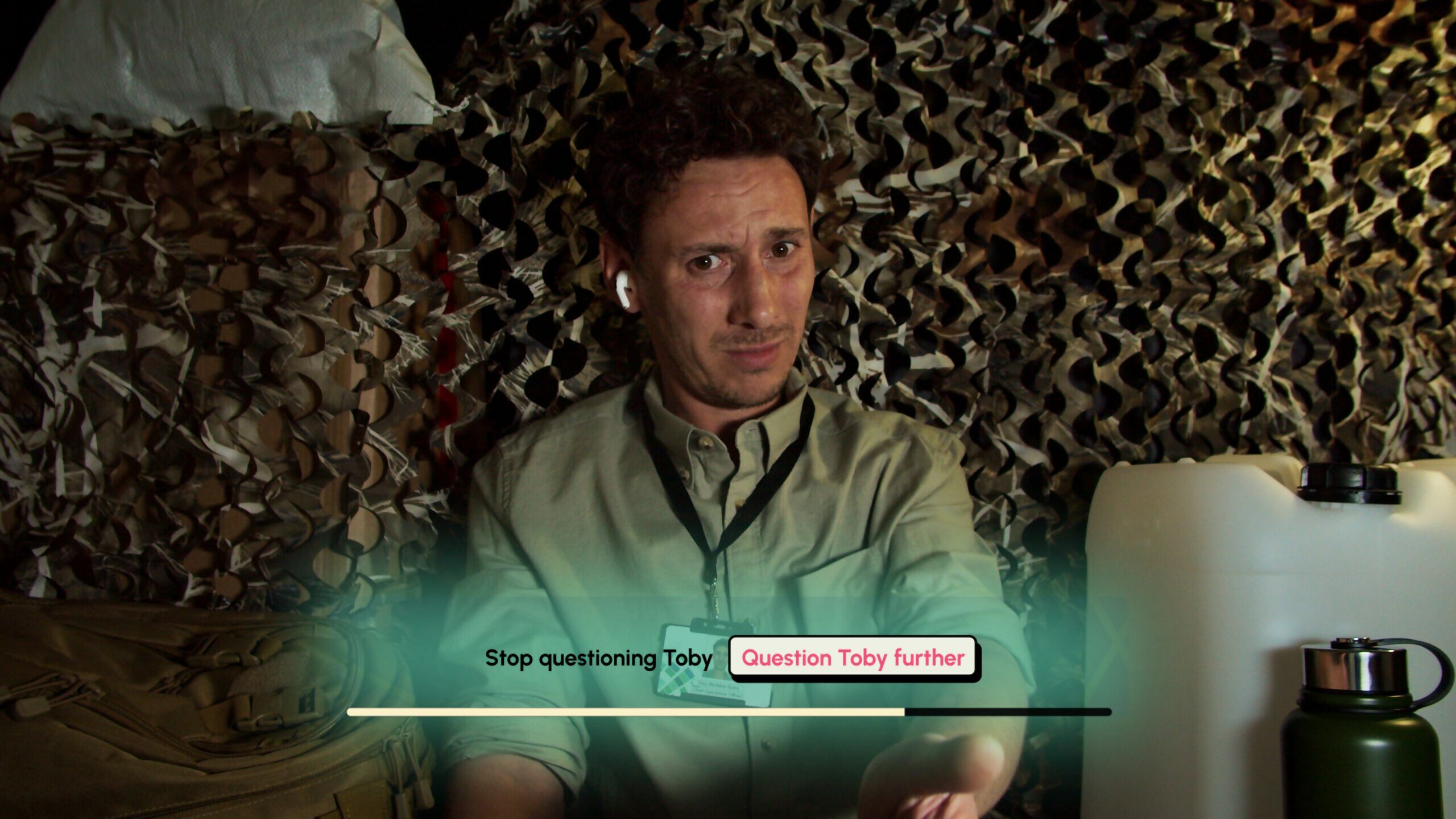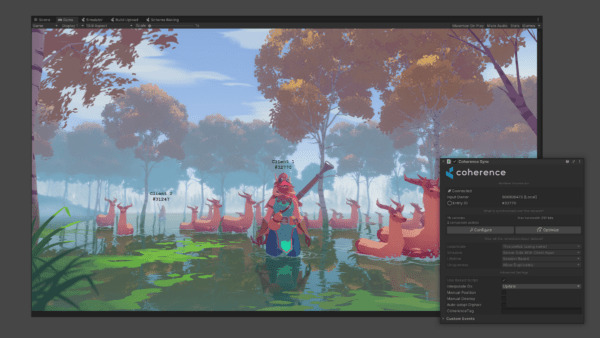
FMV, or full-motion video games, are facing a new chapter thanks to British studios and filmmakers using homegrown tech and talent.
Live-action games have only recently begun to escape the taint of history. Whether you remember the 1990s or not, you probably know about the CD-ROM boom and its glut of grainy, schlocky ‘Full Motion Video’ (FMV) experiences – something now viewed as an awkward phase in gaming’s teenage development. And this reputation is far from undeserved, since many such ‘interactive movies’ barely passed muster on either side of that equation. It would surprise no one to discover them sealed off in a box marked ‘evolutionary dead end’.
Nothing stays in its box forever, though, and in the last decade, game designers have successfully rethought the value of live action. Sam Barlow’s 2015 classic Her Story was undoubtedly the flag-bearer for the resurgence, while its highest profile boost was Netflix’s Black Mirror: Bandersnatch in 2018, a nostalgic meta-piece about a character who starts to suspect someone is making decisions on his behalf. Crucially, rather than simply revive the past, these titles reimagined FMV with diverse structures or subject matter.

Interactive movies may eventually access mainstream publicity channels, Banner believes. “The stuff we’re doing could end up being on The Graham Norton Show,” he says.
Now, more studios and filmmakers are looking to explore the fresh potential of interactive film, and live action is enjoying a quiet renaissance. Look closer, though, and you might notice something else. While nineties FMV games largely emerged from Hollywood, many modern productions, including Her Story and Bandersnatch, are British. The UK is spearheading the full motion revolution, taking live action in fascinating directions.
ENTER THE FMV DRAGON
One name that’s become synonymous with this new wave is Wales Interactive, a developer and publisher which boasts a larger catalogue of interactive films than most. That wasn’t the aim, however, when industry veterans David “Dai” Banner and Richard Pring founded the company in 2012. Only when they met some filmmakers looking for a publisher for their interactive movie, The Bunker, did the pieces click into place. “Me and Rich thought it was really interesting,” Banner says, “and we made lots of narrative games anyway, so we thought we could bang heads.” It helped that they’d already considered the possibility of revisiting live action themselves. “We’d noticed that there’s a really good TV and film industry in Wales,” Pring says. “We were wondering why there weren’t more of these [games], so when we met The Bunker guys, it was a match made in heaven.”
Since publishing The Bunker, a post-apocalyptic tale about the last survivor in its titular location, Wales Interactive has gone on to release over a dozen live-action games, including virus outbreak drama The Complex, an adaptation of the adventure book, Deathtrap Dungeon, and crime comedy Who Pressed Mute on Uncle Marcus? Yet despite the breadth and success of these titles, the legacy of the 1990s can be hard to overcome. “When we’ve toured around the world during this rebirth of FMV,” Banner says, “[the genre] has been looked on as a bit campy.”

Richard Pring differentiates in Wales Interactive’s library between choice based ‘film-games’ and ‘game-films’ like The Bunker, which include more exploration and recognisable game mechanics.
Crucially, though, Pring believes that the form is still in its infancy, developing its language like the early days of film, so it has plenty of scope to make a new name for itself. To help it along, Banner and Pring are trying to elevate the production values of their products, combining their game-making know-how with that of talented filmmakers. “There just weren’t enough [third parties] making interactive movies,” Pring says, “so we had to start making them ourselves.” They often work with production company Good Gate Media, which takes care of hiring and executing the shoot. By now, they have a smooth pipeline established, with a proprietary tech called ‘WIST’ that, Pring says, “allows directors from different backgrounds to create interactive movies much more easily”.
As for the games, most still focus on branching storylines led by occasional player choices. The more Wales Interactive has made, however, the more it has started to apply its formula to a wider range of cinematic genres. “If you’d asked us four or five years ago whether we would publish an interactive romcom,” Pring says, “we would have probably said, ‘I don’t think that’s necessarily the best thing in games’.” But then they made the popular Five Dates, a game about online video dating during lockdown, which arguably suits Wales Interactive’s style better than the more typical horror stories and mystery thrillers.
Meanwhile, in London, an alternative line of thinking has emerged from Flavourworks, a studio reappraising how players interface with filmed scenes and actors. Co-founder and creative director, Jack Attridge, set up the company in 2015, having previously worked as an audio and game designer. Flavourworks released its first title, the action thriller Erica, in 2019. “I wanted to do something I felt was being underserved,” Attridge says. “We felt at the time no one was really thinking about live action and games much.”

If the motto of storytelling in movies is “show, don’t tell,” Jack Attridge says, in TouchVideo it’s “Play, don’t say”.
One of the benefits of film, he believes, is that it provides a much more natural language to engage with than traditional game genres. Games often force us to see the world from a wide view, Attridge explains, looking at the back of a character’s head. Whereas in movies, “we’re used to looking at the nuance on the front of people’s faces,” he says. “So I saw some interesting opportunities there in terms of where the focus is.”
The stand-out feature in Erica is its touchscreen (or PS4 touchpad) controls, which has you make dozens of minor physical interventions into the story alongside textual choices. In the opening scene, for example, you flick open and ignite a Zippo lighter, then place the needle of a record player on the vinyl, with the filmed results streaming seamlessly from your input. Attridge was always intent on differentiating his work from the “ropey” reputation of FMV games, and was clear he never wanted to make “a movie where you click some buttons on top of the screen,” he says. “That, for me, feels like playing a DVD menu. I want to interact with the world itself.”
For Attridge, Flavourworks’ ‘TouchVideo’ technology is thus the key to moving live-action gaming closer to a cinematic experience. He cites a scene in Django Unchained as an example of what he wants to achieve, where the camera closes in on Django’s hand slowly pulling his gun from its holster as he tries to repress his anger and resist opening fire. “I don’t know of a game where the focus is on whether I pull a gun out of my holster and how fast I pull it,” he says. “If this [scene] was a game, you’d just point at who you were going to shoot and hold the trigger down.” Games are geared towards external conflicts, he feels, and he’s more concerned with the internal ones.

With lockdown over, Wales Interactive has filmed a sequel to Five Dates called 10 Dates, which will focus on face-to-face encounters.
Certainly, there are signs of deeper connections in Erica, where you tap and drag to perform everyday and plot-changing movements, and Attridge is now building on these foundations. The studio’s second game is Hush, an anthology of short stories set over a single night. The first episode, Crane, was released earlier this year and offers a compact ten-minute experience in which you play a hit-man torn between allegiance to his employers and his mysterious lover. Featuring a range of wildly different endings, depending on your choices you may stumble into a surprisingly tense shoot-out sequence, or find yourself carefully trying to disarm your gun during an intimate moment. “The important thing is that you’re interacting what feels like every 10, 15, 20 seconds,” Attridge says, “and you’re pushing the story forward.”
As the likes of Flavourworks and Wales Interactive provide the tech and design chops for live-action games, however, that still leaves the filming itself, and these new productions are attracting a stream of filmmakers into the games industry. One of these is horror aficionado Jed Shepherd, the writer of cult hit lockdown chiller Host, and now director of soon-to-be-released interactive experience, Ghosts. His philosophy echoes Attridge’s: Shepherd wants to create a more organically cinematic experience. “I’m not going to have any floating words or glowing doors,” he says, “There’s none of that stuff.”
Yet while Ghosts is the vision of a filmmaker rather than a game designer, it’s inspired in part by Shepherd’s interest in games, particularly his experience with FMV ‘classic’ Night Trap. His initial thought process, he explains, was “Night Trap, but better-written, [with] more to do, and cinematic instead of looking like it was made for 50p.”
By coincidence, he was soon contacted by Visible Games, who were interested in working with him. The timing was perfect, and the concept solidified from there.

Steven Sheil had no background knowledge of 1990s FMV, and approached the Uncle Marcus project with a fresh perspective.
Ghosts sees you play the producer of a live ghost-hunting TV show, Shepherd explains, sitting in an outside broadcast van in front of a panel of “about 15 different screens”. It’s your job to direct five hunters exploring a supposedly haunted house, and decide which cameras to screen. The biggest twist, however, and likely most divisive, is that Ghosts can only be played at 10pm in your local time zone, as if it really were a live TV broadcast. Leaving your station once you start will see everyone die. “I wanted to bring back some of that group feeling,” Shepherd says, “like when you used to watch something on TV when there were only four channels.”
Ghosts is a complex passion project, then. Even for someone versed in movie production, filming a non-linear story is a new experience in many ways. On one hand, Shepherd explains, the long editing process of a conventional film was reduced because here players effectively create the edit as they go along. But on the flip side, so much more footage is required. “This is like doing at least ten separate films,” he says, “and criss-crossing [them] with each other.”
It’s also an uphill struggle to build tension when you’re ceding control to the player, but Shepherd adapted by shifting the pieces around, front-loading the game with exposition and breadcrumbs, to create room for ideas that ferment in the player’s mind. “The sense of doom you get from that is palpable,” he says.

While TouchVideo is all about manipulating the physical world, there are sometimes also textual cues and dialogue choices.
Another director who can empathise with some of these hurdles is Steven Sheil, who cut his live-action teeth with Wales Interactive’s Who Pressed Mute on Uncle Marcus? This amateur detective farce spans the course of a dysfunctional family’s Zoom chat, with players trying to figure out which relative has poisoned said uncle. For Sheil, who has a background in horror and crime films, there are of course plenty of transferable skills, but “also a whole new load of things you need to learn”.
It didn’t help that the shoot took place during lockdown, so he couldn’t meet the actors in person and had to talk them through the process of setting up their own equipment, props, and costumes. “While that was exciting,” Sheil says, “I wouldn’t want to have to do it again.” But filming a branching narrative was a challenge in itself, he adds, due to a huge script and multiple plot threads that have to be juggled all at once. Sheil would explain to actors where their characters are in one scene, he says, “and then the next thing we do is the alternate version, where the thing that just happened didn’t happen”.
The experience was still a positive one, however, in part thanks to the expertise that Good Gate and Wales Interactive now bring to making these games, and Sheil is keen to dive back into gaming in the future. “Having been through that process, I’d like to look at how you can do different genres,” he says. “I think there’s something really interesting about how FMV works with time and parallel paths. There are a lot of opportunities there to explore it.”

Shepherd says that the horror in Ghosts is “very British at heart” and references the 1992 BBC show Ghostwatch as an influence.
ACCESS ALL AREAS
Indeed, now that live-action gaming is finding its feet, the topic of future potential is a hot one for all these game designers and filmmakers. True, the form currently remains quite niche, and hasn’t fully shed its gimmicky reputation, but there’s enough happening in Britain alone to suggest this is far from another phase, and will attract and surprise more people in the coming years.
The one bit of potential all our interviewees agree on, in fact, is that live action is perfectly suited to widely appealing, highly accessible games. “The demographic for interactive movies is actually humongous,” Pring says. He feels it’s important that Wales Interactive’s output runs on all kinds of devices and doesn’t require huge time investment. Sheil adds that today’s online culture of sharing theories about TV shows and films feeds into the decision-making processes of interactive movies. “People are used to that mode of thinking,” he says. “We’re playing into that mindset.”
This communicative factor is thus central to Wales Interactive’s plans. “Most people watch our films four or five times,” Banner says, “and they’ll bring in friends or partners to play.” That group dynamic has spread online to Twitch, turning film viewing into a mass collaborative activity rather than a passive one. “People like to watch them with an audience, to hold on the decision, discuss what’s happening,” Banner says. The goal then is to facilitate and improve these forms of participation further, and Wales Interactive has already conducted tests on Twitch and Mixer in which people vote on in-game decisions.

While Hush is an anthology of individual stories, you should see echoes of earlier choices in later episodes.
Shepherd similarly sees interactive movies as a means of introducing people to both film and games. “I don’t want [Ghosts] just to be for horror fans,” he says. “Like with Host, people have said to us that they don’t usually watch horror, but they loved it. I want this game to be either a gateway into horror or a gateway into video games.” And for a filmmaker like Shepherd, crossing over into the comparatively gigantic games industry simply makes sense. “I’m in this to tell stories,” he says. “Games will make my stories reach a wider audience.”
It’s no shock then that Shepherd is keen to continue with games as well as film, and even plans to start his own game company. He also believes that the engine and tools created for Ghosts are highly reusable. “The most valuable thing about this entire [project],” Shepherd says, “is that we’ve created an architecture that other people can build FMV games on.”
Attridge is also an accessibility evangelist, highlighting how attractive live-action experiences can be to non-players, because no expensive gaming equipment is required. “We’ve all got incredible machines in our pockets,” he says. “We think touchscreens are the most beautiful interface we have.” But this doesn’t mean home consoles still can’t attract new players. “We found Erica has fantastic back-seat gaming appeal,” he says. “A lot of people tell us it’s the first game they’ve ever played and finished.”
With that in mind, Attridge is focused on the storytelling versatility of TouchVideo. The Hush anthology, for example, allows players to make plot-changing decisions constantly. “The first ten minutes of a branching game is usually the most branching out,” Attridge says. Conversely, he describes his next project as very linear, aiming to create empathy with the story through interaction, suggesting that the same touch mechanics can enhance a wealth of genres and styles.
Attridge doesn’t believe the value of TouchVideo stops there, however. Currently, Flavourworks is experimenting with integrating 3D graphics and creating party games, believing there are wider applications on the horizon, perhaps on social media platforms such as TikTok. “We see TouchVideo as a third category between film and games,” summarises Attridge. “As we improve the toolset, we might see future influencers creating incredible content with these tools in ways that we would have never imagined.”





